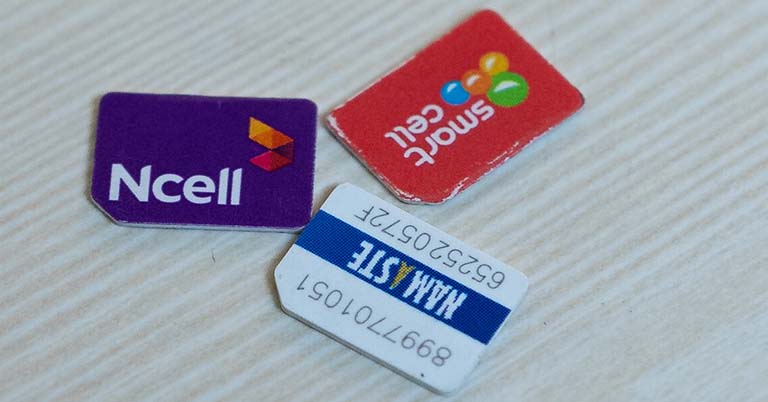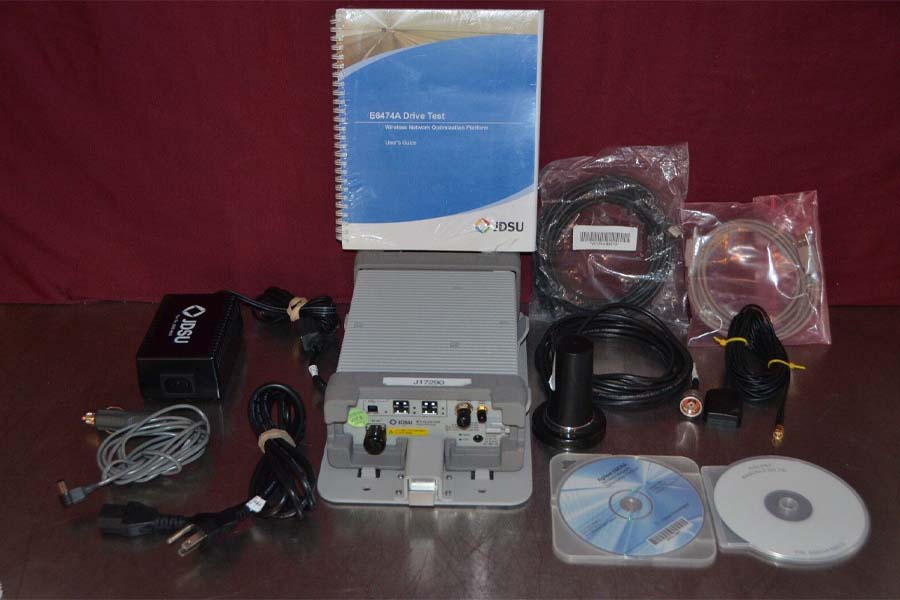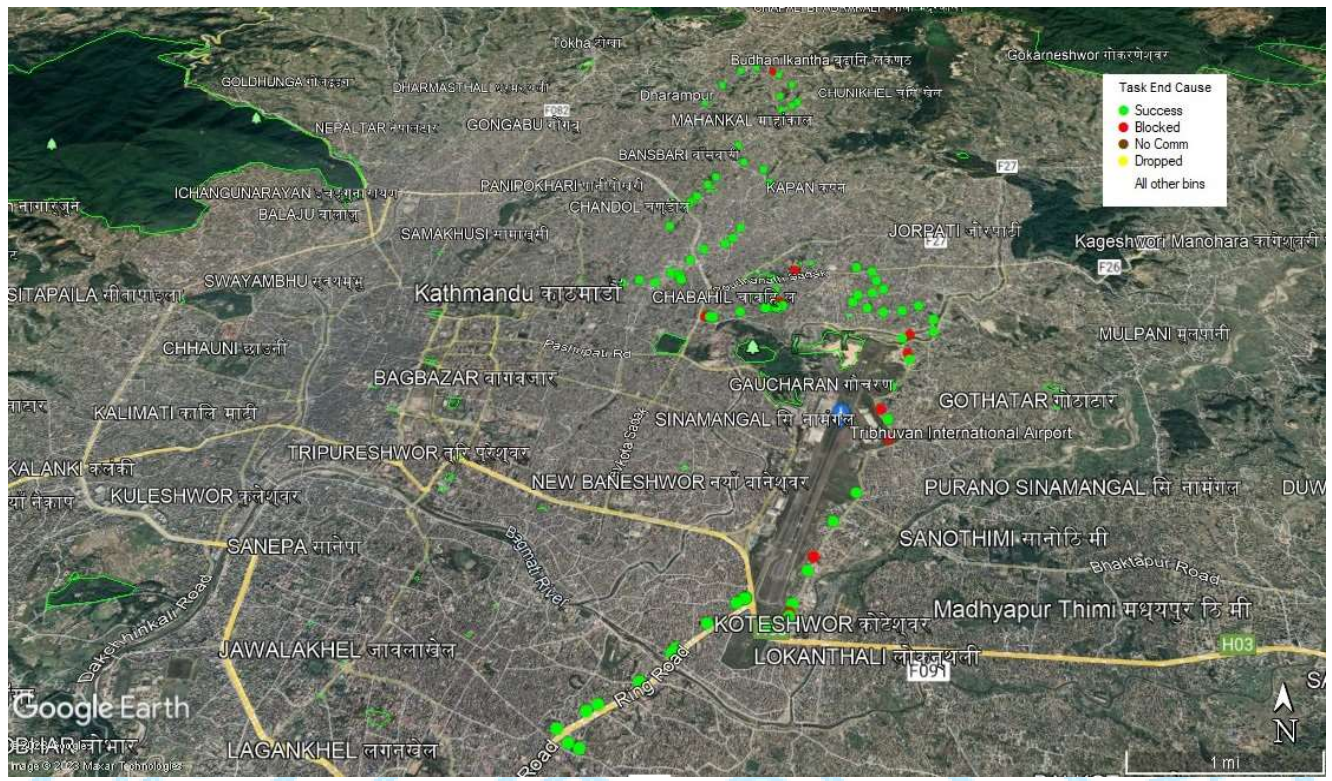
According to NTA’s latest drive test report of Kathmandu which was conducted from February 3 – February 7, 2023 (Magh 20 – Magh 24), Nepal’s all three telecom operators were found to have poor mobile service quality. Let’s know more about the reality of the mobile service standard in Kathmandu.
NTA Drive Test Overview:
What is a drive test?
Before moving forward, let’s first understand what a drive test is. This is a method of testing the quality of mobile networks in an area by mounting testing equipment on a moving vehicle. The vehicle navigates through the area by making repeated voice or data calls. Under this, every service provider’s service in the range is tested at the same time.
The tools are set up in such a way that a suitable network (4G / 3G / 2G) is automatically selected for each service provider based on availability. Here, NTA used the “JDSU E6474A” test tool and the “Gladiator” post-processing tool.

In case you didn’t know, Nepal Telecommunications Authority (NTA) oversees all companies in the telecommunication sector in Nepal, including network service providers, phone importers and sellers, and so on.
- Also read:
- Forget about MDMS, Laptop Device Management System is what Nepal needs
- Prime Minister Dahal’s executive order halts the implementation of MDMS
- NTA makes customs duty mandatory on phones gifted from abroad
Test locations and duration
NTA conducted the drive test in 15 different places in Kathmandu. This includes Gwarko, Koteshwor, Old Sinamangal, Bouddha-Naya Basti, Chabahil, Gaushala, Sifal, Maitidevi, Haadigaun, Kapan, Dhumbarahi, Barphedi, Bhangal, Hathigauda, Budhanilkantha and roads covering those areas.

Similarly, it performed 120-second calls inside the same network of service providers for this test. Meaning NTC to NTC, Ncell to Ncell, and Smart to Smart.
What was the end result?
According to NTA’s regulations, the call setup success rate (CSSR)—which is the number of successful calls in 100 calls—should be equal to or more than 99.99%. But the CSSR of NTC, Ncell, and Smart was just 88.78%, 93.69%, and 26.39%, respectively.
Furthermore, NTA says the call setup time (CST)—which is the waiting time until the call is connected—should be less than or equal to 5 seconds. But the CST of NTC, Ncell, and Smart in the aforementioned test areas of Kathmandu turned out to be 6.97, 5.18, and 11.93 seconds, respectively.
Lastly, the call block rate (CBR) should be less than or equal to 2%, according to NTA. This metric determines the rate of calls rejected by the network. And here as well, all three telcos performed poorly. With NTC, Ncell, and Smart scoring 11.21%, 6.3%, and 73.60%, respectively.
The only parameter where every telecom operator showed positive results was in terms of call drop rate (CDR)—i.e. call automatically hung up in the middle of the conversation. According to the report, all three telcos’ CDR was 0%, while NTA has set the acceptable threshold for CDR to ≤2%.
| Drive Test Date | February 3 – 7 (2023) | |||
| Drive Test Area | Gwarko, Koteshwor, Purano Sinamangal, Bouddha-Naya Basti, Chabahil, Gaushala, Sifal, Handi Gaun, Kapan, Dhumbarahi, Barfedi, Bhangal, Hattigauda, Budhanilkantha | |||
| Telecom Service Provider | NTC | Ncell | Smart | |
| Key figures | NTA threshold | |||
| Call Setup Success Rate | ≥99.99% | 88.78 | 93.69 | 26.39 |
| Call Setup Time | ≤5 seconds | 6.97 | 5.18 | 11.93 |
| Call Block Rate | ≤2% | 11.21 | 6.3 | 73.6 |
| Call Drop Rate | ≤2% | 0 | 0 | 0 |
NTA Drive Test Conclusion:
Based on the report, NTA has instructed all the telecom operators to improve the quality of their network to meet the standards set by the Telecommunication Service Quality Regulations 2073. Seeing how even the country’s capital has such poor mobile service quality, you can easily imagine how things are in Nepal’s rural areas where the telecom operators haven’t set up as strong network infrastructure.
- Meanwhile, check our explainer video about the MDMS system in Nepal.







![Best Gaming Laptops in Nepal Under Rs. 250,000 (रु 2.5 Lakhs) [2025] Best Gaming Laptops Under 2.5 lakhs in Nepal [Feb 2025 Update]](https://cdn.gadgetbytenepal.com/wp-content/uploads/2025/02/Best-Gaming-Laptops-Under-2.5-lakhs-in-Nepal-Feb-2025-Update.jpg)
![Best Gaming Laptops in Nepal Under Rs. 120,000 (रु 1.2 Lakhs) [2025] Best Budget Gaming Laptops Under Rs 120000 in Nepal 2025 Update](https://cdn.gadgetbytenepal.com/wp-content/uploads/2025/05/Best-Budget-Gaming-Laptops-Under-Rs-120000-in-Nepal-2024-Update.jpg)
![Best Laptops Under Rs. 80,000 in Nepal [2025] Best Laptops Under 80,000 in Nepal March 2025 Update](https://cdn.gadgetbytenepal.com/wp-content/uploads/2025/03/Best-Laptops-Under-80000-in-Nepal-March-2025-Update.jpg)
![Best Laptops Under Rs. 70,000 in Nepal [2025] Best Laptops Under 70,000 in Nepal March 2025 Update](https://cdn.gadgetbytenepal.com/wp-content/uploads/2025/01/Best-Laptops-Under-70000-in-Nepal-March-2025-Update.jpg)
![Best Gaming Laptops in Nepal Under Rs. 200,000 (रु 2 Lakhs) [2025] Best gaming lapotp under 2 lakhs Nepal Feb 2025](https://cdn.gadgetbytenepal.com/wp-content/uploads/2025/01/Best-Gaming-Laptops-Under-2-Lakh-Nepal-Feb-2025-Update.jpg)
![Best Mobile Phones Under Rs. 15,000 in Nepal [Updated 2025] Best Phones Under 15000 in Nepal 2024 Budget Smartphones Cheap Affordable](https://cdn.gadgetbytenepal.com/wp-content/uploads/2024/03/Best-Phones-Under-15000-in-Nepal-2024.jpg)
![Best Mobile Phones Under Rs. 20,000 in Nepal [Updated] Best Mobile Phones Under NPR 20000 in Nepal 2023 Updated Samsung Xiaomi Redmi POCO Realme Narzo Benco](https://cdn.gadgetbytenepal.com/wp-content/uploads/2024/01/Best-Phones-Under-20000-in-Nepal-2024.jpg)
![Best Mobile Phones Under Rs. 30,000 in Nepal [Updated 2025] Best Phones Under 30000 in Nepal](https://cdn.gadgetbytenepal.com/wp-content/uploads/2025/01/Best-Phones-Under-30000-in-Nepal.jpg)
![Best Mobile Phones Under Rs. 40,000 in Nepal [Updated 2025] Best Phones Under 40000 in Nepal 2024 Smartphones Mobile Midrange](https://cdn.gadgetbytenepal.com/wp-content/uploads/2024/02/Best-Phones-Under-40000-in-Nepal-2024.jpg)
![Best Mobile Phones Under Rs. 50,000 in Nepal [Updated 2025] Best Phones Under 50000 in Nepal](https://cdn.gadgetbytenepal.com/wp-content/uploads/2025/01/Best-Phones-Under-50000-in-Nepal.jpg)
![Best Flagship Smartphones To Buy In Nepal [Updated] Best flagship phone 2025](https://cdn.gadgetbytenepal.com/wp-content/uploads/2024/07/Best-Flagship-Phones-who-is-it-ft-1.jpg)